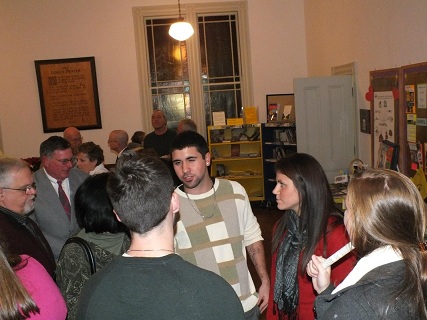
And let us consider how to stir up one another to love and good works, not neglecting to meet together, as is the habit of some, but encouraging one another, and all the more as you see the Day drawing near. (Hebrews 10:24-25 ESV)
Holy week will soon be upon us, which means we will be celebrating the resurrection of Jesus Christ, our greatest hope for this life and the next. Resurrection (Easter) Sunday, along with Christmas Eve, is also one of the best attended days of the church calendar, largely because people who don’t often come to church realize, to varying degrees, that it is an important day. This past Christmas Eve the vestry was full and overflowing with guests who joined us in fellowship.
A recent blog posting by Colin Marshall really got me thinking about the fellowship time we share, over a cup of coffee or sweets, after each Sunday morning service. It also got me thinking about the impact we could have following our Easter services, which are coming up just a few weeks from now. Marshall wonders how it is that “we’ve listened to the Word of God read, heard it proclaimed, sung the praises of our Great God and petitioned Him for mercy in our time of need, and yet we spend the time afterward talking about last night’s movie, the game, the hobby, the state of the nation, or whatever “anything” but the great truths of the Gospel we’ve just heard and by which we’ve been saved?” Of course we want to get to know others better and deeply care about wellbeing, but why is it we still feel uncomfortable striking up conversations about the God we’ve just worshiped together? What better and more natural place to have these conversations than in church?! Even those who are visiting showed up because they have an interest in seeking, hearing from and possibly worshiping the same God who called us here. At the very least they are at a place where they are now open to talking about Him.
Why, then, don’t we more frequently engage in spiritual conversations after each Sunday service? Marshall suggests it is because we often have a half dozen other things to do on a Sunday and this is just another one of them. We’re eager to get to the next thing on the list. He also suggests that those with a serving mindset “find it difficult to get into “God talk” at church. The busyness of serving can keep them from stopping to encourage others and can let them feel they’ve done enough by helping to organize things.”
As the author to the book of Hebrews reminds us, we all called to “stir up one another to love and good works, not neglecting to meet together, as is the habit of some, but encouraging one another.” That encouragement, to put the verse in context, comes from the Gospel. The job of encouraging one another in the faith is not just that of the elders, deacons or the pastor. You and I are each called by God to do this. It is not that we don’t want to do this. Sometimes we just don’t know where to start or what to say.
Marshall offers the following five suggestions, which I think you’ll find helpful for getting on track with some great coffee hour conversation. Please, give them a try:
• Pray during the service that God would lead your conversations, and pray for specific people around you.
• Listen to what God is saying to you through the sermon, songs, call to worship, prayers, and so on, and formulate a comment or question to start a conversation. Pick out two things to try as conversation-starters after church.
• Even if the conversations don’t always get off the ground, your enthusiasm for learning the Bible and knowing God will be contagious. And non-Christians will see that church isn’t dull and boring but fascinating and life-shattering.
• These intentional conversations after church will sometimes lead to prayer for one another. Why not stop for a moment and give thanks or petition God for some need?
• Another way to deepen our fellowship is to ask each other how we came to salvation in Christ. Sometimes we’ve been in church with people for years without ever learning their story. The other day at church I asked a guy named Phil how he became a Christian, and we discovered God had worked in us in very similar ways as young men. The door is now open to building a friendship with this brother. What a joy!
So remember, lots of people will be visiting our church on Easter Sunday because they know it is a meaningful Christian holiday. Join me in showing them the love of Christ, as the body of Christ, by welcoming and engaging them in meaningful conversation. I can’t think of a better way to engage and edify our guests (and each other) than by discussing the significance of that day. You might even ask, “What brought you here today?” The benefits of your conversation will extend far beyond the several minutes you will share that day. Who knows, it may even extend into eternity!





